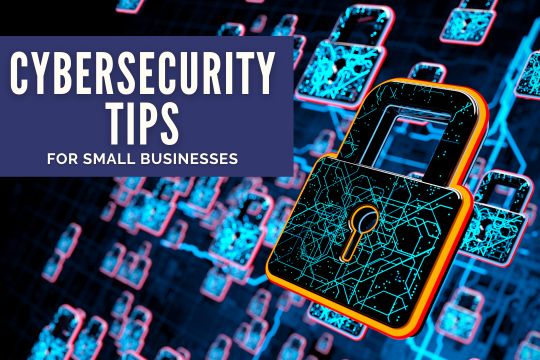As a small business owner, you're forced to wear many hats. It's only natural that some things will fall by the wayside, and unless your business focuses on IT or cybersecurity, it's understandable that you may not be as well-versed in the subject as necessary to protect your sensitive data.
Small Business Risks

According to Netgear, 43% of all cyberattacks target small businesses. That doesn't even take into account medium-sized businesses. If that isn't concerning enough, additional statistics show that over 60% of small and medium-sized businesses cease operations within six months of suffering a data breach. The sheer financial cost of recovering from a cyber attack and the reputational damage that can occur is enough to sink many businesses.
There are many reasons why cyber attackers choose to target small and medium-sized businesses. Still, the unfortunate reality is that they are the most vulnerable to the widest range of threats. We've compiled a list of cybersecurity tips for small business owners that will help you protect your business data, add a substantial layer of security to your operations, and implement some cybersecurity best practices.
Small Business Cyber Security Tips Employee Training
The first area where small business owners can improve their security posture is by training their employees. The prevalence of phishing attacks and other social engineering scams, coupled with the many other employee-centric threat vectors, means that the first line of defense must be your staff.
This training should cover cybersecurity policies and the reasoning behind these policies as studies have shown that employees tend to be more compliant with regulations when they understand the purpose behind the rules. In addition, staff training should be on a recurring basis, including practical exercises, standard classroom training, and regular emailed or posted reminders. You can cover everything from threat vector awareness to remote work security best practices, and it's important to solicit feedback from your personnel to track the effectiveness of your training program.
Risk Assessments
Are you aware of all the threats your company may be facing? Do you track the effectiveness of your cyber security program? Many enterprises don't, and without that data, it's impossible to manage your program effectively.
This assessment should start with evaluating your business data to specifically identify the location of your sensitive data and the layers of security protecting it. Other components include locating methods of gaining access to your network that a cybercriminal might try to exploit and evaluating your security procedures. A risk assessment protects your business from data breaches by identifying the areas most at risk, the potential attack vectors, and the effectiveness of your controls.
Endpoint Security
With the rise in popularity of remote positions and work-from-home policies, we've seen an increase in the number of endpoint devices. Whether we're talking about mobile devices, desktops, or laptops, these endpoint devices are another weak link in your cyber security. Gaining access to your systems is inherently easier when done from a company-owned device or a device known to your network.
We strongly encourage the use of only company-owned devices, but any device used to access your network securely must be password protected, have security applications installed and regularly updated, and should be encrypted.
Software Concerns

Antivirus and anti-malware programs should be installed on every device, and firewalls should be in place on all networks and systems. Software updates and patches must be applied immediately to keep the programs protecting your business functional and close known application gaps.
Secure Passwords
A robust password policy is one of the most important policies you can implement when it comes to cybersecurity tips for small business owners. Requiring strong passwords that are different for every system may seem redundant, but humans are creatures of habit. We tend to reuse the same passwords over and over and to make those passwords easy to remember. Easy-to-remember passwords are also easily guessed or cracked.
Providing a password manager application allows you to force the use of strong passwords while simultaneously defeating the challenge of remembering so many unique sets of credentials. Some of the best password managers can generate passwords, store notes, and use financial institution-level encryption.
Multifactor authentication should also be mandated, and cybersecurity best practices recommend that this secondary challenge be a biometric feature, an authentication app, or a physical key instead of the more common and more easily defeated email or text message code.
Secure Wi-Fi Networks

Another common threat vector is your organization's Wi-Fi network. Even if you don't offer free public Wi-Fi, cybercriminals can easily attack unsecured wireless access points and weak security on Wi-Fi networks. If either of those is compromised, you leave yourself open to man-in-the-middle attacks at one end of the spectrum and complete loss of control through a ransomware attack at the other.
Adjusting some simple settings on your network will pay dividends in terms of security. Your Wi-Fi network should be password protected, and network traffic should be encrypted. It's also recommended that you hide the SSID for your business network so that it must be manually entered into devices to connect.
Back-Up Your Data
All of your business data should be regularly backed up. As we just mentioned, ransomware attacks are quickly becoming one of the most common cyber attacks facing businesses and also one of the most difficult to recover from. If you have recent backup files of your data, the leverage that these cyber criminals think they have by gaining access to and encrypting your files is significantly less. This also helps add a layer of security against inadvertent loss of sensitive data or file corruption.
Principles of Least Access
The last of our cybersecurity tips for small business owners is also one of the most essential. Limit access to your sensitive data to only those who need it to complete their duties. No one should be given blanket access to all business data, and that access should only be for as long as is necessary to accomplish a specific task. This goes for vendors and contractors as well as employees. You can streamline this process by creating set roles within your system for employees with various duties and then having your IT staff assign employees to those roles instead of manually setting the permissions for everyone.
At E-Marketing Associates, we're small business specialists. We know your unique challenges as small business owners, and we thrive on helping you punch above your weight class. That's why we've developed a small business newsletter you can subscribe to for free. Whether you are looking for website design, social media management, or search engine optimization for small businesses, we can develop a custom plan to address your specific business needs. Contact us today to see what we can do for you.








.jpg)
















